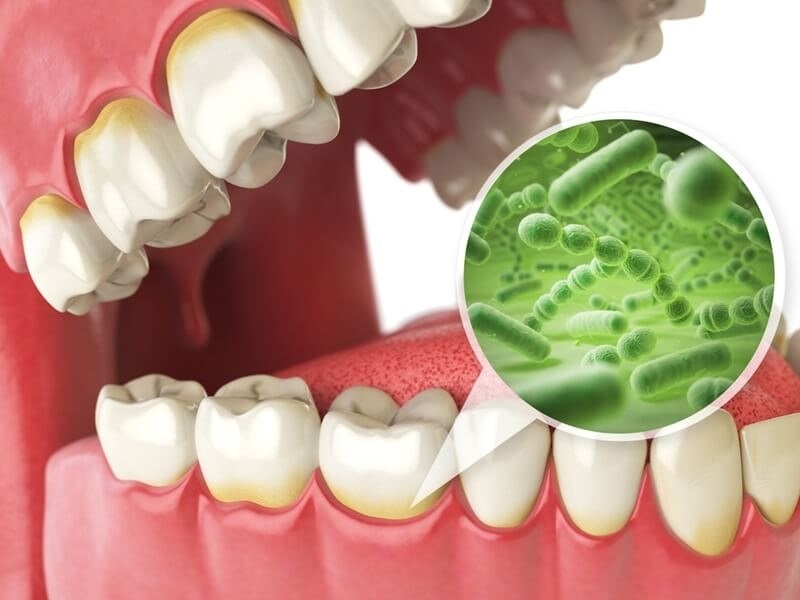
When people think about oral health, they picture cavities, bad breath, or bleeding gums. What rarely comes up is how oral infection bacteria in your mouth can quietly influence your brain. The same microbes that attack your gums are now being linked to depression, anxiety, and even memory issues.
This connection isn’t a stretch. The mouth is one of the body’s busiest microbial hubs, and when the balance shifts, those bacteria don’t just stay put, they spread, triggering inflammation that can reach the brain.
The oral cavity is a crowded neighborhood. More than 700 species live here, including both harmless and harmful ones. The most common bacteria in oral cavity are Streptococcus, Actinomyces, Fusobacterium, and Veillonella. For the most part, they coexist without problems. But once conditions favor the harmful strains, trouble begins.
A big share of that trouble comes from oral anaerobic bacteria—species that thrive in oxygen-free spots like gum pockets. They stick together in biofilms, feed inflammation, and become harder to control over time.
This imbalance—dysbiosis—is what makes the leap from dental problems to bigger health issues, including mental health concerns.
Must Read: Cavity Prevention Tips for Every Family for Stronger Teeth

The idea that microbes in your mouth can affect how you feel sounds strange at first, but the pathways are clear once you break them down.
Bacteria like Porphyromonas gingivalis and Treponema denticola—two of the worst oral anaerobic bacteria—release toxins that keep your immune system on high alert. That constant low-grade inflammation can reach the brain and interfere with normal signaling.
When the gums are inflamed, bacteria or their byproducts can enter circulation. From there, they sometimes cross the blood-brain barrier and fuel neuroinflammation linked to depression and cognitive decline.
What starts in the mouth doesn’t end there. Harmful oral infection bacteria can alter the gut microbiome, which then affects mood and brain chemistry.
Several studies have found differences in the oral bacteria of people with depression compared to healthy individuals. The pattern isn’t just about one type of microbe—it’s about balance. Lower diversity in oral bacteria often goes hand-in-hand with more severe depressive symptoms.
Researchers have also noticed higher levels of certain species like Prevotella nigrescens in people with depression. Even studies on couples suggest oral microbiomes can be shared—meaning your partner’s bacteria may influence your own health more than you think.
The conclusion is simple: your mouth isn’t separate from your mental state.
You may also like: A Guide: How Dietary Acids Impact Your Dental Health
Out of hundreds of species, a small group does the most harm.
All three are oral anaerobic bacteria, and together they create the perfect setup for gum disease and systemic inflammation.
Dogs carry their own set of microbes. Canine oral bacteria include Fusobacterium, Capnocytophaga, Porphyromonas gulae, and Pasteurella. Normally, these bugs stay in your dog’s mouth, but close contact—like face-licking—can pass them to humans.
Older dogs with cognitive decline often show different oral microbiome patterns, especially increases in Porphyromonas gulae. It’s a reminder that oral bacteria and brain health aren’t just linked in humans—they affect animals too. The overlap between species makes the risk worth noting.
The instinct is to wipe everything out with mouthwash or harsh rinses. But the goal isn’t to completely kill oral bacteria. A sterile mouth isn’t realistic—or healthy.
The smarter move is balance. Brushing, flossing, and professional cleanings keep harmful strains under control without destroying the good ones. Cutting down sugar helps too, since sugar-loving bacteria like Streptococcus mutans thrive on it.
Think of it like tending a garden. You don’t burn the soil to get rid of weeds—you remove the bad growth and give the good plants space to flourish. That’s how you manage oral infection bacteria long-term.
The bigger concern here is that we often dismiss gum swelling, bleeding, or recurring mouth ulcers as minor. But oral infection bacteria don’t just stay put; they travel through the bloodstream, creating silent inflammation that can gradually alter brain chemistry. Studies have shown how oral anaerobic bacteria and the most common bacteria in oral cavity release toxins that interfere with serotonin pathways, which directly affects mood stability. If we don’t act early to kill oral bacteria, especially harmful ones like canine oral bacteria strains, the outcome may not just be tooth loss but a slow decline in mental resilience.
Explore More: Ayurvedic Oral Hygiene: Ancient Secrets for Healthy Gums
The link between oral health and mental health is stronger than most people realize. Oral infection bacteria aren’t just dental concerns—they’re connected to inflammation, mood disorders, and possibly even neurodegenerative diseases.
A toothbrush, floss, and regular dental care may seem simple, but they’re frontline defenses not only for your smile but for your mental well-being too.
This content was created by AI